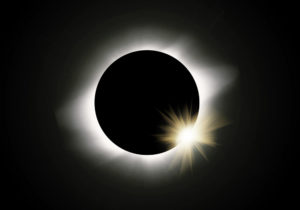Total Eclipse of the Smart? Remember: It’s Science that Allows Us to Ogle

“I’m not a person of faith, but even so, the sun’s reappearance as the moon drew away seemed like the first line of Genesis retold.” In a special section of the New York Times Magazine published earlier this month, Helen Macdonald recounted her first experience viewing a total solar eclipse on a Turkish beach. She describes how she dropped to her knees and was brought to tears by the incomprehensible beauty of what she had witnessed. Macdonald’s almost spiritual awakening is meant to gear up the US population for what the Times is calling “The Great American Eclipse of 2017.”
The total eclipse of the sun by the moon, scheduled to start in Lincoln City, Oregon, at around 9:05 a.m. PDT on August 21, and make its way to Charleston, South Carolina, by 2:48 p.m. EDT, has sparked quite the fanfare. And this excitement makes sense, considering the last total eclipse to happen in the United States was in 1979 and the last time a total eclipse crossed the entire continent was in 1918.
However, what makes this natural phenomenon most interesting is its intersection between precise science and uncertain wonderment. While there are still some out there who see the temporary darkness as a doomsday message from God, modern science simply explains it as the celestial coincidence when the rotations of the moon, sun, and Earth line up. Moreover, scientists are able to chart the exact times and locations of where the “path of totality” will hit. Yet, despite all our advanced knowledge on the topic, eclipses still capture the hearts as well as the minds of those like Macdonald, who are otherwise not religious but experience an unearthly revelation as they peer up at the sky for those few minutes of darkness.
In preparation for Monday’s sun-moon encounter, there have been swaths of accounts from individuals who have dedicated their lives to chasing eclipses. A certain sense of transcendence emerges from these personal stories. Kate Russo, a psychologist and consultant for communities preparing for eclipses, told the Los Angeles Times, “It is the universe rendered in 3D. You are standing in the shadow of an object that is passing between you and the sun. The moon is out there, and it is so vast and huge you feel both insignificant and connected to something greater.”
Anthony Aveni, a retired professor of astronomy and astrology from Colgate College, is equally mesmerized by the phenomenon, despite having a complete and rational understanding of the science behind it. “There is nothing inexplicable about eclipses. How it happens and when it happens is all science, predictable thousands of years out,” he told NYup.com. “But still, to watch the sun go black in the middle of the day, to see stars and planets come out if even just for an instant, seems inexplicable, magical even.”
Therein lays the modern contradiction of the eclipse: although aptly and extensively explained by science, there still remains an inexplicable mysticism about the event. In the days before explanations existed, an eclipse was met with fear and worry. Today, the very logic and rationale that allowed for fear and worry to be dispelled hasn’t managed to replace the equally emotional reactions of shock and awe. In fact, the advancement of science to predict the times and places of an eclipse is what allows people to be irrationally vulnerable as they seek out the sublime. People purposefully put themselves in the face of an eclipse where level-headedness is abandoned, reason is suspended, and new meanings take shape.
As the science of eclipses has evolved, so has the experience. Not only is it the transformation from fear to worry to awe, but it’s also the transformation of human agency. As scientific knowledge has progressed, an eclipse no longer plunges humans into unexpected darkness. Rather, scientific discovery has allowed humans to take control of the eclipse, so to speak, and purposefully revel in its natural process. While the sight of the moon eclipsing the sun on Monday will elicit humility from onlookers across the country, it’s important to remember the personal empowerment and efficacy supplied by science that underpins our modern fascination with the cosmos.
